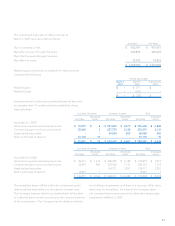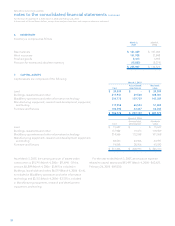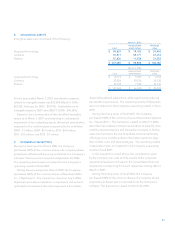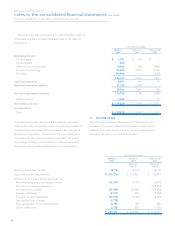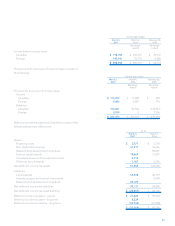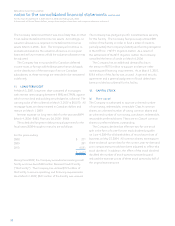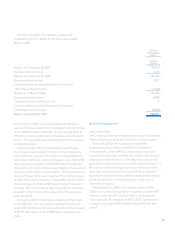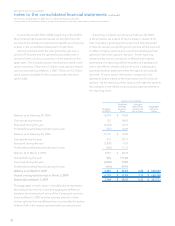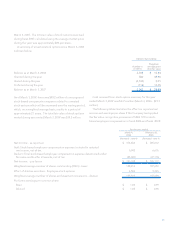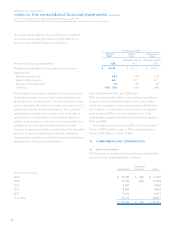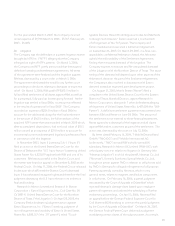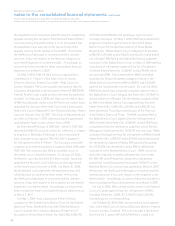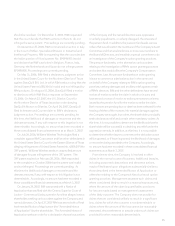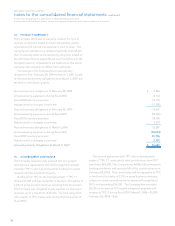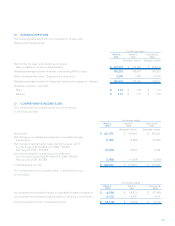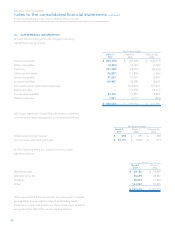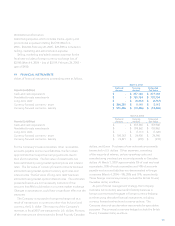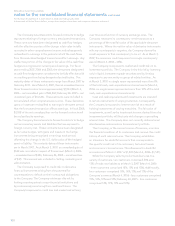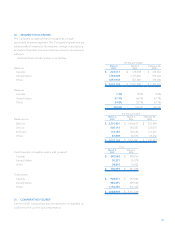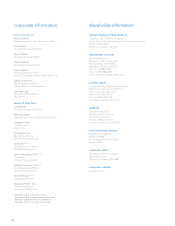Blackberry 2007 Annual Report Download - page 95
Download and view the complete annual report
Please find page 95 of the 2007 Blackberry annual report below. You can navigate through the pages in the report by either clicking on the pages listed below, or by using the keyword search tool below to find specific information within the annual report.93
For the year ended March 3, 2007, the Company incurred
rental expense of $9,794 (March 4, 2006 - $5,767; February 26,
2005 - $3,023).
(b) Litigation
The Company was the defendant in a patent litigation matter
brought by NTP, Inc. (“NTP”) alleging that the Company
infringed on eight of NTP’s patents. On March 3, 2006,
the Company and NTP jointly announced that they signed
definitive licensing and settlement agreements. All terms
of the agreement were finalized and the litigation against
RIM was dismissed by a court order on March 3, 2006.
The agreement eliminated the need for any further court
proceedings or decisions relating to damages or injunctive
relief. On March 3, 2006, RIM paid NTP $612.5 million in
full and final settlement of all claims against RIM, as well as
for a perpetual, fully-paid up license going forward. As the
litigation was settled in fiscal 2006, no amount is reflected
in the results of operations for fiscal 2007. The Company
recorded an expense of $201.8 million in fiscal 2006 to
account for the additional charge for the final settlement
in the amount of $162.5 million, the full writedown of the
acquired NTP license that was recorded in March 2005 which,
after accumulated depreciation, had net book value of $18.3
million as well as an expense of $21.0 million to account for
incremental current and estimated legal and professional fees
in connection with this litigation.
In November 2003, Inpro II Licensing S.à.r.l. (“Inpro II”)
filed an action in the United States District Court for the
District of Delaware (the “U.S. Inpro Action”) asserting United
States Patent No. 6,523,079 against both RIM and one of its
customers. RIM was successful in the District Court, and
the matter was heard on appeal on December 8, 2005 at the
Federal Circuit. On May 11, 2006, the Federal Circuit released
its decision which affirmed the District Court’s dismissal.
Inpro II has exhausted its appeal rights and therefore the final
judgment dismissing the U.S. Inpro Action in its entirety is
final and binding.
Research In Motion Limited and Research In Motion
Corporation v. Eatoni Ergonomics, Inc., Civil Case No. 05
CV 0851-K. United States District Court for the Northern
District of Texas (“the Litigation”). On April 28, 2005, the
Company filed a declaratory judgment action against
Eatoni Ergonomics, Inc. (“Eatoni”) seeking judgment of
non-infringement and invalidity of Eatoni’s United States
Patent No. 6,885,317 (“the ‘317 patent”), titled “Touch-
typable Devices Based On Ambiguous Codes And Methods
to Design Such Devices.” Eatoni asserted a counterclaim
of infringement of the ‘317 patent. The Company and
Eatoni mediated and executed a Settlement Agreement
on September 26, 2005. On March 29, 2007, in a final, non-
appealable, confidential Arbitration Award, the Arbitrator
upheld the enforceability of the Settlement Agreement,
finding that it requires dismissal of the Litigation. The
Company expects to execute and file a stipulated dismissal
of the Litigation with the Northern District of Texas. The exact
timing of the dismissal will depend upon other aspects of the
Arbitrator’s decision. As part of the Settlement Agreement,
the Company is also involved in discussions with Eatoni
directed toward an expected joint development project.
On August 31, 2005, Morris Reese (“Reese”) filed a
complaint in the United States District Court for the Eastern
District of Texas, Marshall Division, against Research In
Motion Corporation, along with 7 other defendants alleging
infringement of United States Patent No. 6,427,009 (the “009
Patent”). A definitive settlement agreement was entered into
between RIM and Reese on June 29, 2006. The amount of
the settlement is not material to these financial statements.
Reese agreed to a dismissal of the litigation and all claims
against RIM and its customers as part of the settlement. The
action was dismissed by the court on July 12, 2006.
By letter dated February 16, 2004, T-Mobile Deutschland
GmbH (“TMO-DG”) and T-Mobile International AG
(collectively, “TMO”) served RIM’s wholly-owned UK
subsidiary, Research In Motion UK Limited (“RIM-UK”), with
a third party notice in relation to litigation in Germany (the
“Neomax Litigation”) in which the plaintiff, Neomax Co., Ltd.
(“Neomax”), formerly Sumitomo Special Metals Co., Ltd.,
brought an action against TMO in relation to cell phones sold
by TMO in Germany for alleged infringement of a European
Patent purportedly owned by Neomax, which in very
general terms, relates to magnets installed as components
in cell phones. On February 16, 2006, a partial judgment
was issued by the Court of Appeals in Düsseldorf which
rejected Neomax’s damage claim based upon negligent
patent infringement and ordered the scheduling of further
evidentiary proceedings. On April 3, 2006, Neomax filed
an appeal before the German Federal Supreme Court for
Civil Matters (BGH) seeking to overturn the partial judgment
by the Court of Appeals in Düsseldorf. On March 26, 2007,
the German Federal Patent Court delivered a judgment
invalidating certain claims of the subject patent. As a result,


